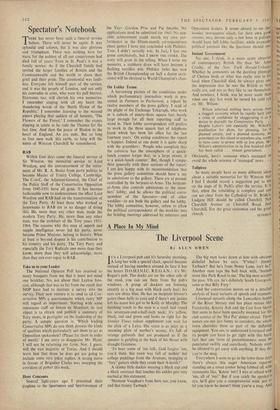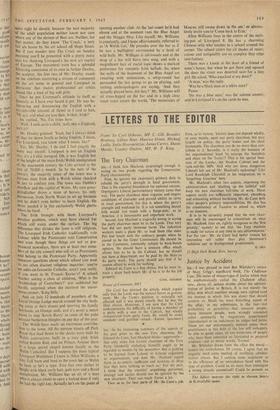A Place In My Mind
The Liverpool Scene
By ALUN OWEN
1 Vs a Liverpool pub and it's Saturday morning., IA long bar with a special clock, special because instead of having numbers around its face it has the letters D.O.M.I.N.I.C. R.E.G.A.N.: it's Mr. Regan's pub. The docks are on the other side of the road, you can see them from the pub's windows. A group of dockers are listening intently to a big man with black curly hair; his eyes are china blue. He has an incipient brewer's goitre (beer belly to you) and if there's any justice left his name has got to be Kelly or Murphy. The finishing touch to the man is a scarf tied round his seventeen-and-a-half-inch neck; it's yellow, black, red and green and looks so right for the Sunday Times colour supplement you wait for the click of a Leica. His voice is as juicy as a steaming plate of mother's scouse, it's full of strange gutturals that are produced as if the speaker is gargling at the back of his throat with draught Guinness.
`To hear some of 'em talk, God forgive 'em, you'd think this town was full of nothin' but college puddings from the Avenues, twanging at "lecy" guitars while they count their A-levels!'
A skinny little docker wearing a black cap and a black overcoat that touches his ankles gets very excited at this statement.
'Norman Vaughan's from here too, you know, and that Jimmy Tarbuck.'
The big man looks down at him with obvious disbelief before he says. 'Y'what? JimmY Tarbuck? But he's from Penny Lane, isn't he) Another man taps the ball back with, 'Sounds more like Park Road to me.' The big man accepts the pass. 'Oh aye, he's definitely South Liverpool, same as that Billy Fury.'
And the conversation moves on to a detailed analysis of local variants of speech and manners.
Liverpool sprawls along the Lancashire banks of the River Mersey and has place names like Fazakerley, Knotty Ash and the Cast Iron Shore that seem to have been specially invented for the club comics of the 'Hot Pot' dinner circuit. These names are not just funny to outsiders, the whole town cherishes them as part of the deflating equipment. Y.ou see, to understand Liverpool and its people you have to get right with this basic fact that any form of pretentiousness must he punctured swiftly and mercilessly. Nobody must be allowed to get away with anything. If they do, you're the mug.
Everywhere I seem to go in the town these days there's always this eager American reporter standing on a street corner being fobbed off with statements like, 'Know 'em? I was at school with 'em, all of 'em I ' But if you catch the speaker's eye, he'll give you a conspiratorial wink just to let you know he doesn't think you're a mug. And
quite right he should, because the vast majority of the adult population neither know nor care where any of the shrines of Beat are. Neither, for that matter, do they know 'The Crack,' a very fair ale house by the art school off Hope Street. But if you wander into The Crack on Sunday Morning you'll be presented with a pretty noisy case for thinking Liverpool's the new art capital of Europe. The movement even has a splendid blistering conscience of its own in Arthur Dooley, the sculptor. Six feet two of Mr. Dooley stands on the sidelines muttering a stream of comments on the art scene in general and Liverpool in Particular that makes professional art critics sound like a load of big soft girls.
Once he put Liverpool's attitude to itself as honestly as I have ever heard it put. He was be- labouring and denouncing the English with a considerable amount of thrust so I said to hint, 'Oh aye. and what are you then, Arthur, Irish?'
He replied, 'No, I'm from here.'
'Well,' I said, as to a child, 'well, this is England,' isn't it?'
Mr. Dooley grinned, 'Yeah, but I always think of that lot down South as being English, I mean, I'm Liverpool, you know what I mean, like?'
Yes. Mr. Dooley, I do and I feel exactly the same way myself. Liverpool is not an English City, it's a Celtic mongrel. Oh, it was English but at the height of the mass Irish/Welsh immigration of the nineteenth century the Celts arrived at the rate of 70,000 a month. So by the turn of the century the majority voice of the town was a curious slum Irish with a Welsh whine chucked in just to confuse you. The town was Dublin's overflow and the capital of Wales. My own great- grindfather drove a team of horses, his only Possession, from North Wales to set up business and he didn't even bother to learn English.-He never needed it in this exclusively Welsh ghetto Where he lived.
The Irish brought with them Liverpool's Peculiar problem, which may have abated but Which still exists under the surface. The big difference that divides the town is still religious. The Liverpool Irish Catholics traditionally vote
Labour while the Protestants vote Conservative
and even though these things are not so pro- nounced nowadays, there are at least two mem- bers of the city council who still sit as Protestants and belong to the Protestant Party. Apparently innocent questions about which school you went to are often discreet religious inquiries: you're an odds-on-favourite Catholic, aren't you really, if You went to St. Francis Xavier's? A school teacher asking a class of children, 'Who is the Archbishop of Canterbury?' was saddened but hardly surprised when she received the unani- mous answer, 'King Billy.'
And on July 12 hundreds of members of the 1-4a! Orange Lodge march around the city bash- ing away at their drums and sporting the family
heirloom, an Orange sash; and it's never a smart Move to sing 'Kevin Barry' in some of the pubs around Netherton Heights on any day of the year.
The Welsh have made an enormous contribu- tion to the town. All the narrow streets off Park Road that lead down to the docks were built by Welsh contractors, built in a rosy pink brick called Ruthin Red, and on Princes Avenue there ts a large spired chapel known locally as the Welsh Cathedral. But I suppose the most typical Liverpool Welshman I know is Allen Williams, a
tiny Taff born and bred in the town but so Welsh ' to look at he's a type. Five feet two inches in height with blpck curly hair, pale eyes and a florid complexion, Mr. Williams has an air of a man Who is always about to open a locked door if only he had the right key. Actually he's on the point of opening another club. At the last count he'd had eleven and at the moment runs the Blue Angel and the Maggie May. Like myself, Mr. Williams is constantly, and I hope affectionately, referred to as 'A Welsh Get.' He presides over the bar as if he was a bullfighter surrounded by a herd of wild bulls. Mr. Williams is aficionado and at the drop of a hat will burst into song, and with a magnificent lack of racial logic shows a marked preference for romantic Irish ballads. So, when the walls of the basement of the Blue Angel arc sweating with enthusiasm, a whip-round has persuaded the last group to go on playing, and visiting anthropologists are saying, 'And they actually played here, did they?' Mr. Williams will sit cross-legged on the bar and in a high clear tenor voice assure the world, 'The mountains of Mourne still sweep down to the sea,' or alterna- tively invite you to 'Come back to Erin.' -
Allen Williams lives in the centre of the melt- ing-pot of Liverpool 8. He has a charming Chinese wife who teaches in a school around the corner. The school caters for all shades of races; colour and nationality are so complex they edge into fantasy.
There was a knock at the door of a friend of mine's house, but when he got there and opened the door the street was deserted save for a tiny girl. He asked, 'Who knocked at my door?'
'A man,' was the reply.
'Was he a black man or a white man?' .
Pause.
'He was a blue man,' was the solemn answer, and in Liveipool it's on the cards he was.



































 Previous page
Previous page